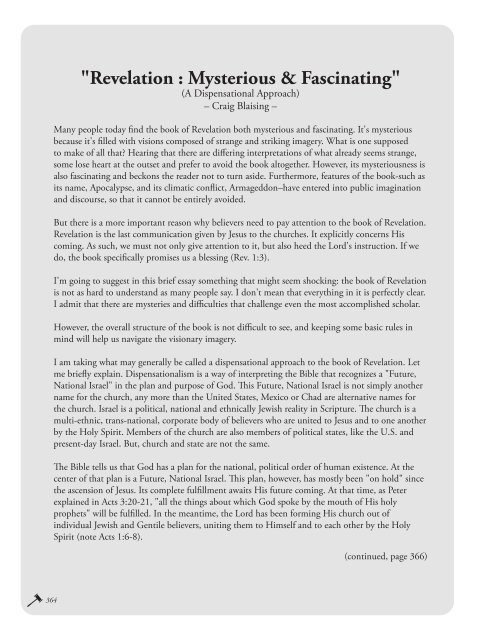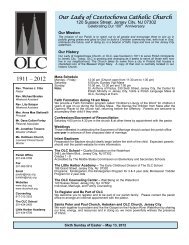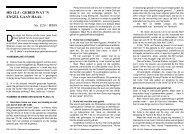- Page 1 and 2:
We Believe
- Page 3 and 4:
"Baseline" (a part of the BiLD Trai
- Page 5 and 6:
4 Preface Welcome to the first step
- Page 7 and 8:
6 We Believe ("A Survey of Theology
- Page 9 and 10:
8 VII. Soteriology: Part One (Doctr
- Page 11 and 12:
10 XI. Ecclesiology (Doctrine of th
- Page 13 and 14:
12 Morris, Leon. I Believe in Revel
- Page 15 and 16:
14 "Definitions of Theological Disc
- Page 17 and 18:
16 The Preaching Event
- Page 19 and 20:
18 Other "Theologies" • Natural T
- Page 21 and 22:
20 "Requirements for Studying Theol
- Page 23 and 24:
22 "Historical Systems of Theology"
- Page 25 and 26:
24 "An Important Feature Of Dispens
- Page 28 and 29:
Session 2 BIBLIOLOGY { › doctrine
- Page 30 and 31:
II. BIBLIOLOGY (Doctrine of the Bib
- Page 32 and 33:
. In history Acts 17:24-27 "The God
- Page 34 and 35:
3. Special revelation : That disclo
- Page 36 and 37:
B. Inspiration (2) "Since all we kn
- Page 38 and 39:
3. Primary Biblical texts (on inspi
- Page 40 and 41:
4. Issue : Inerrancy a. Defined : S
- Page 42 and 43:
C. Canonicity 1. Definition of cano
- Page 44 and 45:
. Applied to the New Testament D. I
- Page 46 and 47:
. Conviction : for the world John 1
- Page 48 and 49:
E. Interpretation 1. Definitions :
- Page 50 and 51:
. Neo-orthodox method : That method
- Page 52 and 53:
F. Literal (normal) Interpretation
- Page 54:
5. Context of the Dispensation : Th
- Page 57 and 58:
56 Quotes: • Amos 4:13 (NASB) "Fo
- Page 59 and 60:
58 Quotes: Philosopher Blaise Pasca
- Page 61 and 62:
60 Quotes: Pantheism • "Pantheism
- Page 63 and 64:
62 Quotes: Panentheism • "Panthei
- Page 65 and 66:
64 God God's Self-Revelation Reveal
- Page 67 and 68:
66 Psalm 145:1-7 What is God Like?
- Page 69 and 70:
68 Graphic Portrayal of the Attribu
- Page 71 and 72:
70 Theologians Categories Attribute
- Page 73 and 74:
72 Theologians Categories Attribute
- Page 75 and 76:
74 Theologians Categories Attribute
- Page 77 and 78:
76 "Immutability" Issue : Does God
- Page 79 and 80:
78 Righteousness : Psalm 19:7-11 (f
- Page 81 and 82:
80 Compound Hebrew Names for God (B
- Page 83 and 84:
82 The Ultimate Reality of God Thro
- Page 85 and 86:
84 "Theological Statements of the D
- Page 87 and 88:
86 The Concept of "Trinity" (in OT
- Page 89 and 90:
88 Quotes: "Time after time, New Te
- Page 91 and 92:
90 Illustration of the Trinity
- Page 93 and 94:
92 (© 1990 David Miller. Used by p
- Page 96 and 97:
Session 4 ANTHROPOLOGY { › doctri
- Page 98 and 99:
IV. ANTHROPOLOGY (Doctrine of Man)
- Page 100 and 101:
B. Image of God (Imago Dei) : 1. Ma
- Page 102 and 103:
2. What is the Image of God? (Four
- Page 104 and 105:
3. How has sin affected the Image o
- Page 106 and 107:
C. Essential Nature of Man 1. The D
- Page 108 and 109:
3. Primary Views of the Distinct Pa
- Page 110 and 111:
c. Traducian Theory The view that "
- Page 112 and 113:
D. Man as Male and Female 1. Equali
- Page 114 and 115:
2. Differentiation of Roles a. Majo
- Page 116 and 117:
Genesis 2:20 "So the man gave names
- Page 118 and 119:
Significance : Headship of the man
- Page 120 and 121:
c. In the church family : (1) Men a
- Page 122:
E. Fall of Mankind 1. Described (Bi
- Page 125 and 126:
124 Faulty Ideas (Notions) About Si
- Page 127 and 128:
1. Law of God 126 "Law" in the Scri
- Page 129 and 130:
128 Notes on "The Origin of Sin" 1.
- Page 131 and 132:
130 "Place of Sin & Provision of Sa
- Page 133 and 134:
132 Fall of Angels The first sin wa
- Page 135 and 136:
Terms for "Inherited Sin" (Sin Natu
- Page 137 and 138:
136 Further Thoughts on "Imputation
- Page 139 and 140:
138 Comparison: "Inherited vs. Impu
- Page 141 and 142:
140 Personal Sins (Committed by All
- Page 143 and 144:
142 HYMN "God, Be Merciful to Me" T
- Page 146 and 147:
Session 6 CHRISTOLOGY { › doctrin
- Page 148 and 149:
VI. CHRISTOLOGY A. Identity of Chri
- Page 150 and 151:
(2) By NT description (a) John 1:1-
- Page 152 and 153:
C. The Incarnate Christ Insights :
- Page 154 and 155:
4. Reasons (for incarnation) : a. T
- Page 156 and 157:
c. To provide a sacrifice for sin f
- Page 158 and 159:
5. Incarnation and Full Deity a. Jo
- Page 160 and 161:
D. Union of Deity and Humanity in C
- Page 162 and 163:
E. The Kenosis ("Emptying") of Chri
- Page 164 and 165:
F. Christ and His Sinlessness 1. Th
- Page 166 and 167:
2. The testing of Christ's sinlessn
- Page 168 and 169:
G. Life of Christ 1. His life : Rec
- Page 170 and 171:
. Priest (1) Qualifications (a) He
- Page 172 and 173:
c. King (1) Old Testament predictio
- Page 174 and 175:
H. Death of Christ 1. Prominent the
- Page 176 and 177:
I. Resurrection of Christ 1. Biblic
- Page 178 and 179:
3. The nature of Resurrection a. It
- Page 180:
Concluding Thoughts "Never forget t
- Page 183 and 184:
182 Quotes: Salvation : Remedy for
- Page 185 and 186:
184 Key Passages: Past Present Futu
- Page 187 and 188:
186 Definition : Sanctification •
- Page 189 and 190:
188 (Lightner, Sin, the Savior and
- Page 191 and 192:
190 (R.Lightner, 226)
- Page 193 and 194:
192 Salvation In Relation to the De
- Page 195 and 196:
194 "Four Great Needs All Sinners H
- Page 197 and 198:
196 "A Further Word" (Redemption, P
- Page 199 and 200:
198 (Continued from page 199) 4. Mo
- Page 201 and 202:
200 Summary : Theories On The Atone
- Page 203 and 204:
202 The Extent of the Atonement (Ta
- Page 206 and 207:
Session 8 SOTERIOLOGY { › doctrin
- Page 208 and 209:
PART TWO : SOTERIOLOGY (VIII in Cou
- Page 210 and 211:
B. God’s Motives and Salvation 1.
- Page 212 and 213:
II. MAJOR THEMES FOR SALVATION A. E
- Page 214 and 215:
C. Regeneration 1. Defined: "The wo
- Page 216 and 217:
B. Salvation Brings Us a New Positi
- Page 218 and 219:
C. Salvation Empowers Us to a New L
- Page 220 and 221:
1 2 A happy and meaningful life beg
- Page 222:
Let's review… You know that… 1.
- Page 225 and 226:
224 Clarification of Terms A. Angel
- Page 227 and 228:
226 (Charts, 75) FUNCTION/PURPOSE I
- Page 229 and 230:
228 Special Abilities Of Angels (Ge
- Page 231 and 232:
230 Key Passages Related To Angels
- Page 233 and 234:
232 Key Passages Related To Angels
- Page 235 and 236:
234 Key Passages Related To Angels
- Page 237 and 238:
236 How Many Angels Are There? Thou
- Page 239 and 240:
1. "Spirit" …referring to their n
- Page 241 and 242:
240 Do People Have Guardian Angels?
- Page 243 and 244:
242 1. Angels Are Above Humans Insi
- Page 245 and 246:
244 The Identity of the Serpent in
- Page 247 and 248:
246 A Theological Issue : Was it po
- Page 249 and 250:
248 Names of Satan TITLE EMPHASIS C
- Page 251 and 252:
250 "Satan and Ezekiel 28" Premise:
- Page 253 and 254:
252 "Satan and Ezekiel 28" (Continu
- Page 255 and 256:
254 "Five Ways God Uses the Enemy's
- Page 257 and 258:
256 "Resisting Demonic Influence :
- Page 259 and 260:
258 10 12 13 17 18 20 "Ephesians" (
- Page 261 and 262:
260 The Supposed Origin of Demons *
- Page 263 and 264:
262 "Demons Are Sensual" (M. Unger,
- Page 265 and 266:
264 "What Demons Can Do To Men" (M.
- Page 267 and 268:
266 1. Wicked "The Perverted Nature
- Page 269 and 270:
268 Position Angelic Creatures Apos
- Page 271 and 272:
270 Position Angelic Creatures Apos
- Page 274 and 275:
Session 10 Pneumatology { › doctr
- Page 276 and 277:
X. PNEUMATOLOGY (Doctrine of the Ho
- Page 278 and 279:
2. Holy Spirit is God : a. He is ca
- Page 280 and 281:
(2) Omnipotence ("all power") Luke
- Page 282 and 283:
B. The Work (Ministry) of the Holy
- Page 284 and 285:
c. Regarding Human Enablement In th
- Page 286 and 287:
. During early life (1) Luke 2:40 "
- Page 288 and 289:
d. At death (1) Strengthened to off
- Page 290 and 291:
C. The Work of the Holy Spirit in S
- Page 292 and 293:
4. Baptizing Ministry a. Into Chris
- Page 294 and 295:
D. The Gifts of the Holy Spirit 1.
- Page 296 and 297:
E. The Filling of the Holy Spirit 1
- Page 298 and 299:
(2) Yieldedness to Christ • 1 The
- Page 300 and 301:
c. Power for serving Christ and oth
- Page 302 and 303:
F. Other Ministries of the Holy Spi
- Page 304 and 305:
Session 11 ECClESIOLOGY { › doctr
- Page 306 and 307:
XI. ECCLESIOLOGY (Doctrine of the C
- Page 308 and 309:
B. Derivation of "Church" 1. Biblic
- Page 310 and 311:
2. "Church" (ekkēsia) can refer to
- Page 312 and 313:
F. Functions of the Local Church 1.
- Page 314 and 315: G. Organization of the Church 1. Ty
- Page 316 and 317: 1 2 3 4 5 6 7 8 Elder Qualification
- Page 318 and 319: . Biblical words (1) Elder (Grk. "p
- Page 320 and 321: d. Biblical responsibilities (Elder
- Page 322 and 323: (d) Commissioning 1 Timothy 5:22 "N
- Page 324 and 325: (d) Praying James 5:14 "Is any one
- Page 326 and 327: 2. Deacons a. Biblical qualificatio
- Page 328 and 329: 3. Deaconesses a. Biblical passage
- Page 330 and 331: (2) Against office I. Ordinances (S
- Page 332 and 333: (1) It was the early church practic
- Page 334 and 335: . Its significance (1) It is an out
- Page 336 and 337: c. Its mode (1) Three (3) common mo
- Page 338 and 339: d. Its subjects (1) Who can be bapt
- Page 340 and 341: 3. Lord's Supper a. Its institution
- Page 342 and 343: Insight : (2) It is a pledge of the
- Page 344: c. Its participants J. Church Disci
- Page 347 and 348: 346 Reasons for Studying Prophecy A
- Page 349 and 350: 348 The Three Eschatological "Death
- Page 351 and 352: 350 Their Habitation Eternal Death
- Page 353 and 354: 352 Perspectives on Annihilationism
- Page 355 and 356: 354 Intermediate State of Man Betwe
- Page 357 and 358: 356 Theological Covenants "Covenant
- Page 359 and 360: 358 Abrahamic Covenant (Two Visual
- Page 361 and 362: 360 The Kingdom: Unifying Theme of
- Page 363: 362 One Suggested Way to See the Re
- Page 367 and 368: A dispensational approach to the bo
- Page 369 and 370: 368 "Two Key Prophetic Books in the
- Page 371 and 372: 370 Preterist Historic churches Ide
- Page 373 and 374: 372 Divergent Evangelical Views of
- Page 375 and 376: 374 Comparison of John 14:1-3 and 1
- Page 377 and 378: 376 Views of Prophecy THE RAPTURE F
- Page 379 and 380: 378 "The Millennium vs. The Eternal
- Page 381 and 382: 380 Judgment Time Place Persons Bas
















